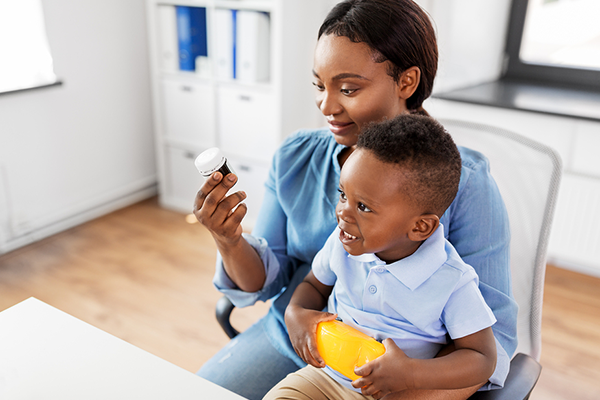Brightly colored liquids. Fun flavors like grape and bubblegum. Shiny, sugary candy-like gummies.
Child’s medicine is designed so that children will take it happily—even if sometimes we don’t want them to.
Every year, Poison Control (800-222-1222) gets more than 200,000 calls from panicked parents about children who drank or ate too much medicine. Most are for children ages one and two. “Depending on the medicine, even just a couple swallows could be harmful to a child,” said Dr. April Hartman, division chief of general pediatrics at the Children’s Hospital of Georgia.
Kids have a way of getting into something when they really, really want it. And as with most cases, it’s our job as parents to outmaneuver them.
Strategy No. 1: Put it up, up and away.
Sure, it’s more convenient to keep medicine next to the bed or on the kitchen counter when kids are sick. Then, it’s easy to forget to put it away (guilty!)
“The best place to store any medicine—or cleaning products too for that matter—is up on a high shelf, even if you need a stepladder to reach it, and ideally behind a lock since kids are good at climbing,” said Hartman. Also make sure to store the dosage cups or syringes with the medicine so you’re not hunting for it or guessing the amount on a spoon.
Vitamins count too. While many are water-soluble, which means if you take too much, your body just pees them out, others aren’t. Fat-soluble vitamins can build up and become toxic if you take too many.
Strategy No. 2: ‘Childproof’ isn’t a guarantee.
Childproof tops are great, but they can’t 100% guarantee that your child can’t open it. “Some kids as young as 9 months have the manual dexterity to open a childproof bottle,” said Hartman. “The other thing is that many kids put things in their mouths. So they just need to put the top in their mouths, and push and twist it the right way to pop it open.”
Strategy No. 3: Understand—and really know—how much your child needs.
It’s really easy to misread the directions on your child’s medicine. Or to accidentally fill a dosage cup or syringe to the wrong line. Or to use a tablespoon instead of a teaspoon. Doublecheck you’re doing it right anytime you use a medicine for the first time.
For babies, you’re going to need to get the dose from your child’s doctor since it’s based on weight, and getting the amount right is especially important since infant medicines are more concentrated. That means they’re stronger, so you need less.
Children under 4 shouldn’t get cough and cold medicines. For older kids, make sure to give them specific medicine to treat the symptoms they have. For example, if your child just has a cough, reach for the cough medicine, not the multi-symptom medicine.
Strategy No. 4: Talk it up.
Make sure your children know that medicines are only for parents or other adults to touch. Kids love to copy what we do, so even a young child might think they’re grown-up enough to give themselves medicine to feel better, since that’s what they’ve watched you do. “A child shouldn’t give themselves medicine until you feel they’re mature enough to be able to read the label and understand what dose to take,” said Hartman.
Also talk to your child about not taking any medicine or pills from other kids at school. “You want to caution them about never taking medicine without permission from an adult in charge,” said Hartman.
Strategy No. 5: Be safe with your medicine, too.
The same goes for any home your child visits, such as a grandparent or sitter. Pill boxes marked with the days of the week shouldn’t be kept on the kitchen counter, for example. And if you or another adult accidentally drops any pills, search high and low to make sure you find them all since kids have a way of hunting things out.
Strategy No. 6: Post the number for Poison Control (800-222-1222).
It’s not the most attractive thing to put on your fridge or on your wall, but the number to Poison Control could save your child’s life. Don’t make your child throw up, don’t drink anything else—just call. “Anytime your child eats or drinks something they shouldn’t, the first thing you should do is call Poison Control,” said Hartman.




